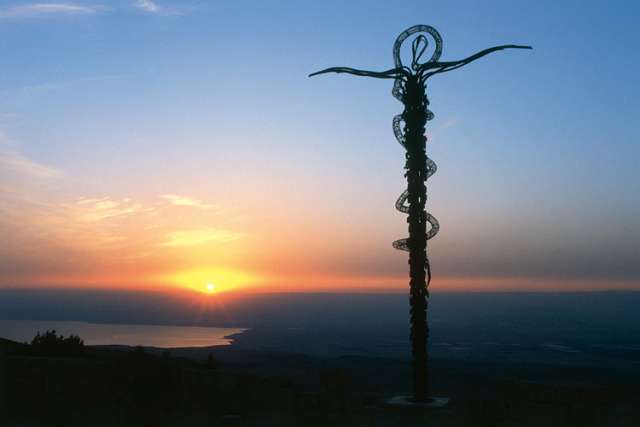Fr. Scott Lewis is an associate professor of New Testament at Regis College, a founding member of the Toronto School of Theology.
He is a past president of the Canadian Catholic Biblical Association.
Trinity Sunday (Year A) June 15 (Exodus 34:4b-6, 8-9; Daniel 9; 2 Corinthians 13:11-13; John 3:16-18)
The people in the Bible perceived God in diverse and sometimes contradictory ways. Throughout the book of Exodus, the people of Israel alternated between resentment and complaint towards God on the one hand and sheer terror on the other. They complained bitterly to God continually out of their fear and lack of trust. But when Moses approached the mountain to encounter God, the people refused to go anywhere near it. They were quite content to send him in their place, and in fact Exodus referred to him as the one who spoke face to face with God as if to a friend.
‘One God, one world, one people’
By Fr. Scott Lewis, S.JPentecost Sunday (Year A) June 8 (Acts 2:1-11; Psalm 104; 1 Corinthians 12:3b-7, 12-13; John 20:19-23)
People have many different understandings of the Holy Spirit. For some, it is a life-changing encounter with the divine, while for others it remains a distant and abstract theological formula. Even within the pages of the New Testament, the Holy Spirit is cloaked in differing forms and works in various ways.
No shortcuts to the Lord
By Fr. Scott Lewis, S.JAscension of the Lord (Year A) June 1 (Acts 1:1-11; Psalm 47; Ephesians 1:17-23; Matthew 28:16-20)
The people who witnessed the ascension of Jesus didn’t really understand what God was up to and they were not exactly in sync with the mind and heart of God. We perhaps share more with them than we care to admit.
True followers have Jesus’ guidance
By Fr. Scott Lewis, S.JSixth Sunday of Easter (Year A) May 25 (Acts 8:5-8, 14-17; Psalm 66; 1 Peter 3:15-18; John 14:15-21)
The proclamation of the Gospel took hold in a very powerful way in Samaria. The Samaritans received the Word enthusiastically. Exorcisms, healings and miracles were the order of the day. This doesn’t make much of an impression on us now — we have heard it so many times, so what is the big deal?
Jesus is the way, the truth and the life
By Fr. Scott Lewis, S.JFifth Sunday of Easter (Year A) May 18 (Acts 6:1-7; Psalm 33; 1 Peter 2:4-9; John 14:1-12)
Tension between various groups has been a fact of life in the Christian Church right from the beginning. Human nature is fairly constant.
God’s mercy allows us to repent
By Fr. Scott Lewis, S.JFourth Sunday of Easter (Year A) May 11 (Acts 2:14a, 36b-41; Psalm 23; 1 Peter 2:20b-25; John 10:1-10)
Peter’s words rolled across the crowd like the voice of doom. They were thunderstruck at his message: somehow they had crucified the one whom God had designated as Lord and Messiah.
The divine will always involved pain, struggle
By Fr. Scott Lewis, S.JThird Sunday of Easter (Year A) May 4 (Acts 2:14, 22b-28; Psalm 16; 1 Peter 1:17-21; Luke 24:13-35)
There are two streams of history active in our world and they often work at cross-purposes. The first stream consists of human schemes and behaviour that are often the expression of desires, fears, jealousy and hatred. Even our best intentions are often fatally compromised by the presence of these tendencies. The world as we experience it is the unhappy result. The other stream is that of God’s will operating in history. It is relentless; even when temporarily diverted or blocked by human behaviour, it always triumphs in the end. God’s will is the redemption of all humanity and the transformation of the world.
No substitutes for the Lord
By Fr. Scott Lewis, S.JSecond Sunday of Easter (Year A) April 27 (Acts 2:42-47; Psalm 118; 1 Peter 1:3-9; John 20:19-31)
The Church had very simple beginnings. There were no impressive church buildings or elaborate liturgies. In those first generations of the faith, believers met together in their homes. Their new faith was not just a religion but a new way of life lived together and in common. The presence of the Spirit and their shared, unified life were the source of energy and power. There was no “mine and thine” attitude, for they shared all that they had, ensuring that no one was deprived of the basics of life. Their shared ideals and union of minds and hearts bound them together in what they called the body of Christ. This resulted in a community in which the trust and support level was very high. But far more powerful was the observation that they ate their shared meals with “glad and generous hearts.”
Selfless love takes us on God’s path
By Fr. Scott Lewis, S.JResurrection of the Lord (Year A) April 20 (Acts 10:34a, 37-43; Psalm 118; Colossians 3:1-4; John 20:1-18)
Christians do not often sound joyful and excited when describing the wonderful deeds of Jesus. Perhaps more disturbing is the fact that many would be hard pressed to describe the activity of Jesus in today’s world or in their own lives.
Jesus died in agony trusting absolutely in the Father
By Fr. Scott Lewis, S.JPassion Sunday (Year A) April 13 (Isaiah 50:4-7; Psalm 22; Philippians 2:6-11; Matthew 26:14-27:66)
There is a great difference between passivity and non-violence. People often confuse the two, but the first is something to overcome while the latter is a powerful spiritual principle.
The divine Spirit strengthens
By Fr. Scott Lewis, S.JDeath comes in many guises. Degradation, humiliation and oppression are considered by many as far worse than the literal cessation of biological life.












